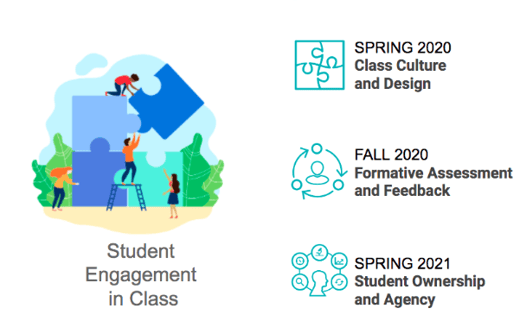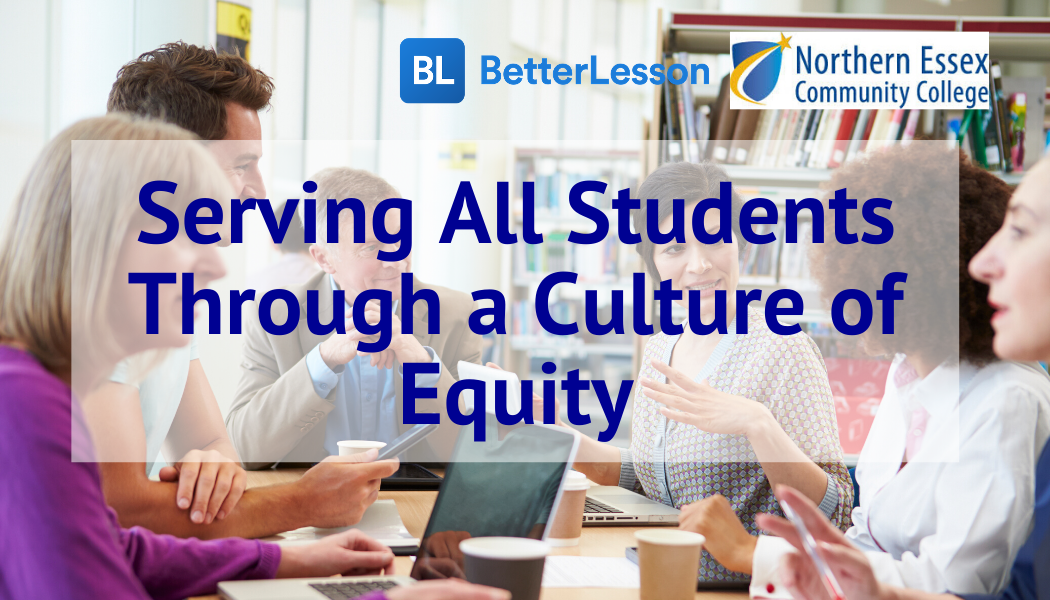OVERVIEW
NECC is committed to serving a diverse student body and strives to continually design and deliver integrated, structured, and inclusive student experiences that maximize success for all students. In particular, NECC seeks to close the opportunity gaps for students of color and is partnering with BetterLesson to deliver an iterative, consistent, and integrated approach to professional learning that will equip academic teams and faculty members to create a culture of equity in classes. We understand this goal can be achieved only if we are intentional in implementing classroom practices and policies designed with equity in mind.
Starting in Spring 2020, BetterLesson and NECC will launch a pilot professional learning workshop titled Serving All Students Through a Culture of Equity. The goals of this pilot are to:
- Respond to NECC faculty and staff’s willingness to take action and requests for support and resources
- Inform a high level strategic vision by supporting the academic community to design and deliver inclusive teaching and learning experiences geared toward equity.
- Provide structure, tools, and resources for the academic community to share learnings and best practices with peers
WHY IS THIS WORK IMPORTANT TO NECC?
In order to address the opportunity gap that still remains for NECC’s Latino students , it is of utmost importance that our academic community work toward creating learning environments that are inclusive, responsive, and engaging of diverse learners. To this end, the workshop Serving All Students Through a Culture of Equity will cover the following content areas:

Spring 2020: Class Culture & Design
A student-centered environment is one that is responsive to the needs of all students and involves them in decisions that will influence the learning culture. Including students in ownership of culture requires considerable planning and deliberate implementation. When done well, these are some characteristics of student-centered environments:
- Student voice is incorporated into the development and implementation of policies, routines and procedures
- Students, deans, chairs, faculty and all participants in the academic community develop strong relationships rooted in trust
- Student needs take priority in the design and implementation of learning, and the feedback that faculty give students on assignments is personalized to meet the needs of individual students
Fall 2020: Student-centered Formative Assessment & Feedback
Student-centered assessment and feedback can guide teaching and learning practices, help shape future student learning, allow strong communication with individual students about their progress, and ensure students feel ownership and motivation over their own learning and growth. Student-centered assessments identify and target what students need most in their learning, allowing the academic community to ensure each student is provided with learning opportunities that support their individual growth. When done well, some characteristics of what success looks like include:
- Students are assessed in a variety of ways and at an appropriate level for the individual student
- Student assessment data and feedback guides policy and instruction
- Students are provided with regular, timely, actionable feedback, and they feel a sense of ownership over their own learning and growth
Spring 2021: Student Agency & Ownership
An environment that provides students with true ownership, agency, and choice is one in which students are able to make guided choices for themselves based on different criteria - their personal interests, their individual learning profiles, or an analysis of their strengths and weaknesses. The goal is for these choices to generate student investment in the task while at the same time aligning with what the academic community knows students need to learn and master. When students are entrusted with choices that can lead to a positive impact on their learning, these are the sorts of behaviors that can be observed:
- Varied approaches to instruction are used based on students’ preferences, strengths, and areas for growth, while keeping in mind the skills and content areas that students will need to master
- Students set, manage, and reflect on goals, and they are able to explain what they are working on, how it supports their goals, and how the tasks and content are aligned to their individual skills, abilities and affinities
- Faculty conferences with students about their goals and how to achieve them
HOW IS THE WORKSHOP STRUCTURED?
Our goal in Spring 2020 is to gather your valuable feedback on this model of professional learning to help inform the design of our partnership with BetterLesson going forward.
In Spring 2020, you will have an opportunity to engage in a collaborative professional learning experience on Friday, February 28th, 2020 on Class Culture & Design: This workshop will ground participants in a common language and understanding of what a student-centered class culture looks like, provide opportunity for participants to explore relevant strategies, and equip participants with tools to translate strategies into immediate action.
We plan to offer the following workshops over the course of three semesters, and our hope is that you will love this experience so much that you leave hungering for more and participate in all three cycles of learning!
- Spring 2020: Class Culture & Design
- Fall 2020: Student-Centered Formative Assessment & Feedback
- Spring 2021: Student Agency & Ownership

